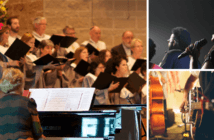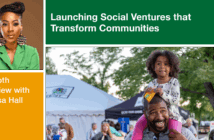Mark Gornik and Maria Liu Wong have been working to understand new practices of ministry that are emerging in vital and diverse urban settings. They have discerned five important themes and practices in how good, sustainable, and flourishing ministry occurs in cities, and in other settings as well.
Practices of Ministry in the City is an initiative at City Seminary of New York engaged in gathering and sharing stories, data, and practices that support and encourage the church in our urban age. As we listen to the visions and desires of our city’s Christian community, especially churches, pastors, and leaders from Africa, Asia, and Latin America, we are seeking to understand the underlying practices that sustain and guide urban ministries.
After reviewing the data across all of our conversations, we discerned from them a template of important themes and practices for how good, sustainable, and flourishing ministry in the city occurs. There is no single pathway of ministry in an ever-changing city. But there are approaches and processes that make a difference.
The work of innovation, creativity, and risk-taking most commonly starts with small steps that grow into bigger and unexpected ones. We may be looking one way, but God is looking backward, forward, and to the present into our lives and experiences.
1. Begin with what is in front of you.
Ministry in the city begins with what is right in front of us, perhaps right under our feet or just out of the way, and it unfolds in ways that fit into the context. Look around, pray, think, share this journey with others, wait on the Spirit, try to see afresh what is right in from of you, and take the time that is needed.
Because no two settings, neighborhoods, or cities are alike, the gospel takes shape in the local context. Whatever city or neighborhood you are in, beauty and ministry, the energies of the Spirit, and the city go together. When the work that is done fits the context, it will come from within, not from without.
2. Relationships come first.
Starting a new church, creating affordable housing, feeding the poor, training youth pastors, advocating for a cause, addressing legal issues that face refugees and immigrants — these are some of the very concrete needs that ministry seeks to address. But if there is one theme we have heard over and over, it is that the heart of ministry is not solving a large societal problem or launching a new church, however significant those are, but being attentive to and valuing relationships. This is especially true when we see cities as complexly interconnected relationships, cultures, networks, and institutions. The theologian and educator Ruth Padilla DeBorst emphasizes relationships formed in listening, learning, and giving testimony to the impact of people and their presence in community.
Relationships place a priority and a premium on time, people, building community, and patience. Programs, staff, and planning each have an important place in ministry in the city, but relationships are the foundation and the key to longevity and sustainability. This is true in work of all professions, community development in the neighborhood, and pastoral leadership at all levels.
3. Community matters.
Ministry in the city is not just what we do as individuals but what we accomplish as part of communities. In the context of the city, our local pockets of community support us and remind us of what is important. Our community can be our family, a small group, our worshiping congregation. For pastors and church workers, community can be a support system of peers that helps sustain us in healthy and thriving ministry. Community is the context for forgiveness, for vulnerability, and for unpacking our experiences. Community is integral to establishing resilience in ministry.
4. Try new things, take risks.
Ministry in the city is about trying new things, taking risks, making mistakes, finding new ways of doing things through continual learning. For if the practice of ministry begins with waiting on God, it is also about being ready when the Spirit moves, and the time is right for acting. The work of innovation, creativity, and risk-taking most commonly starts with small steps that grow into bigger and unexpected ones. We may be looking one way, but God is looking backward, forward, and to the present into our lives and experiences.
Of course, while trying something new and risky can be exciting, we are always going to make mistakes and are ever faced with the possibility of what seems like failure. But experience and experts show us that reflecting on and learning from failure are the processes by which new knowledge and practice are developed. And in the reign of God, we can’t always see how God is connecting the pieces of our stories. Our lives, churches, and ministries belong to God.
5. Who you are is significant.
The final lesson we have heard is that it’s not just the plans or designs for ministry that we come up with that matter: who you are as leaders is what matters most. Self-awareness, the interior life of the believer, recognition that we can’t do anything without God, gratitude, humility, patience, commitment, the willingness to forgive, transparency, and other areas of personal character are critical to living fully into one’s vocation and calling. Who we are in Christ and how we are attending to our journey matter profoundly to ministry in the city.
This article is adapted from Stay in the City: How Christian Faith is Flourishing in an Urban World (William B. Eerdmans, 2017) by Mark R. Gornik and Maria Liu Wong. Used by permission. The book is available at Cokebury and Amazon.
Related Resources
- Staying Attuned to Your Community by Lovett H. Weems, Jr.
- Your Community is Your Congregation by Joe Daniels
- Organizing a Missional COMMUNITY by Doug Powe And Hal Knight






